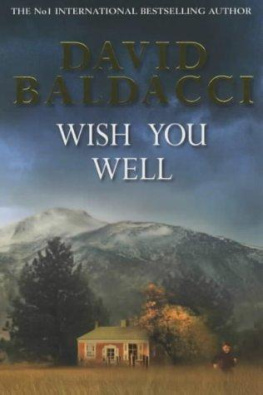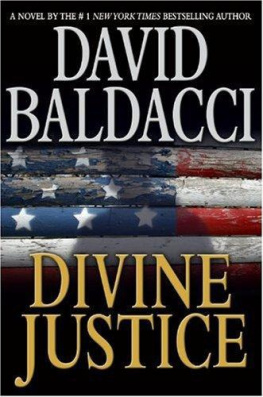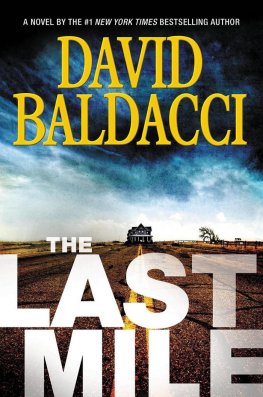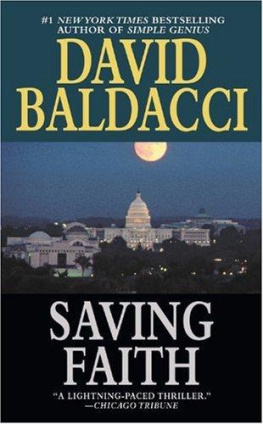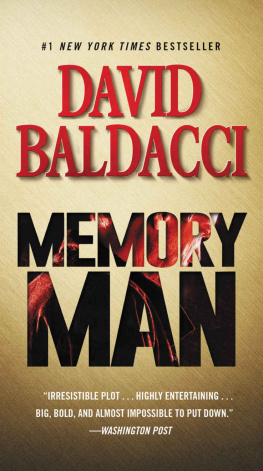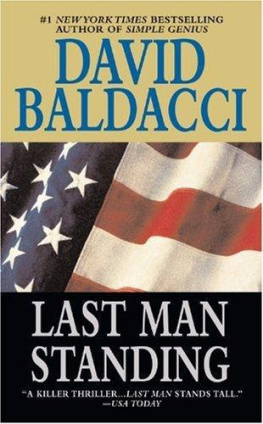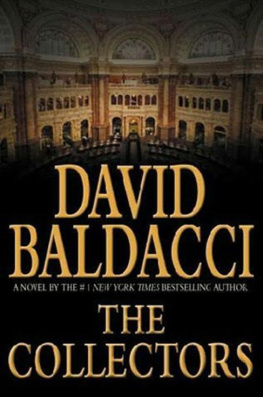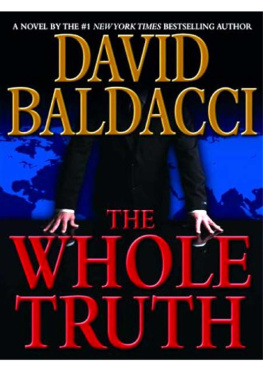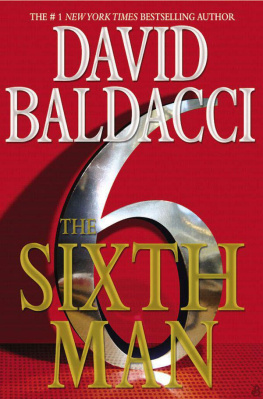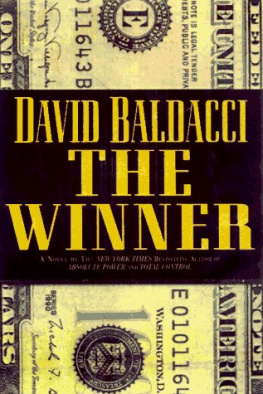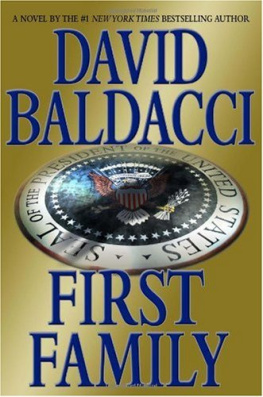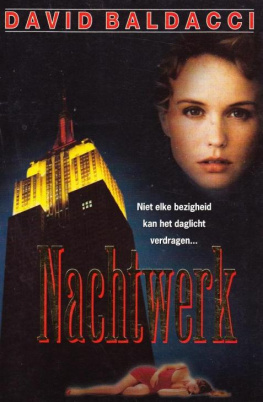DAVIDBALDACCI
WISHYOU WELL
This book is a work of fiction. Names,characters, places, and incidents are the product of the author's imaginationor are used fictitiously. Any resemblance to actual events, locales, orpersons, living or dead, is coincidental.
WARNER BOOKS EDITION
Copyright 2000 by Columbus Rose, Ltd. Allrights reserved. No part of this book may be reproduced in any form or by anyelectronic or mechanical means, including information storage and retrievalsystems, without permission in writing from the publisher, except by a reviewerwho may quote brief passages in a review.
To mymother, the inspiration for this novel
Contents
AUTHOR'S NOTE
The story in Wish You Well is fictional, but the setting, other thanthe place names, is not. I have been to those mountains, and also was fortunateto grow up with two women who called the high rock home for many years. Mymaternal grandmother, Cora Rose, lived with my family in Richmond for the lastten years of her life, but spent the prior six decades or so on the top of amountain in southwestern Virginia. At her knee I learned about that land andthe life there. My mother, the youngest of ten, lived on that mountain for thefirst seventeen years of her life, and while I was growing up she passed alongto me many fascinating stories from her youth. Indeed, both the hardships andthe adventures experienced by the characters in the novel would not beunfamiliar to her.
In addition to the stories I listened to as a child, I spent considerabletime interviewing my mother in preparation for writing Wish You Well, andit was an enlightening time for me, on many levels. Once we reach adulthood,most of us assume we know all there is to know about our parents and otherfamily members. However, if you take the time to ask questions and actuallylisten to the answers, you may find there is still much to learn about peopleso close to you. Thus this novel is, in part, an oral history of both where andhow my mother grew up. Oral histories are a dying art, which is sad indeed, forthey show appropriate respect for the lives and experiences of those who havecome before. And, just as important, they document those remembrances, for oncethose lives are over, that personal knowledge is lost forever. Unfortunately,we live in a time now where everyone seems to be solely looking ahead, asthough we deem nothing in the past worthy of our attention. The future isalways fresh and exciting, and it has a pull on us that times past simply cannever muster. Yet it may well be that our greatest wealth as human beings canbe "discovered" by simply looking behind us.
Though I am known for my suspense novels, I have always been drawn tostories of the past in my native Virginia, and tales of people living in placesthat sharply limited their ambitions, yet provided them with a richness ofknowledge and experience few have ever attained. Ironically, as a writer, I'vespent the last twenty years or so hunting relentlessly for story material, andutterly failed to see a lumberyardful within my own family. However, while itcame later than it probably should have, writing this novel was one of the mostrewarding experiences of my life.
WISHYOU WELL
CHAPTER ONE
THE AIR WAS MOIST, THE COMING RAINTELEGRAPHED by plump, gray clouds, and the blue sky fast fading. The 1936four-door Lincoln Zephyr sedan moved down the winding road at a decent, ifunhurried, pace. The car's interior was filled with the inviting aromas of warmsourdough bread, baked chicken, and peach and cinnamon pie from the picnicbasket that sat so temptingly between the two children in the backseat.
Louisa Mae Cardinal, twelve years old, tall and rangy, her hair the color ofsun-dappled straw and her eyes blue, was known simply as Lou. She was a prettygirl who would almost certainly grow into a beautiful woman. But Lou wouldfight tea parties, pigtails, and frilly dresses to the death. And somehow win.It was just her nature.
The notebook was open on her lap, and Lou was filling the blank pages withwritings of importance to her, as a fisherman does his net. And from the girl'spleased look, she was landing fat cod with every pitch and catch. As always,she was very intent on her writing. Lou came by that trait honestly, as herfather had such fever to an even greater degree than his daughter.
On the other side of the picnic basket was Lou's brother, Oz. The name was acontraction of his given one, Oscar. He was seven, small for his age, thoughthere was the promise of height in his long feet. He did not possess the lankylimbs and athletic grace of his sister. Oz also lacked the confidence that soplainly burned in Lou's eyes. And yet he held his worn stuffed bear with theunbreakable clench of a wrestler, and he had a way about him that naturallywarmed other's souls. After meeting Oz Cardinal, one came away convinced thathe was a little boy with a heart as big and giving as God could bestow onlowly, conflicted mortals.
Jack Cardinal was driving. He seemed unaware of the approaching storm, oreven the car's other occupants. His slender fingers drummed on the steeringwheel. The tips of his fingers were callused from years of punching thetypewriter keys, and there was a permanent groove in the middle finger of hisright hand where the pen pressed against it. Badges of honor, he often said.
As a writer, Jack assembled vivid landscapes densely populated with flawedcharacters who, with each turn of the page, seemed more real than one's family.Readers would often weep as a beloved character perished under the writer'snib, yet the distinct beauty of the language never overshadowed the blunt forceof the story, for the themes imbedded in Jack Cardinal's tales were powerfulindeed. But then an especially well-tooled line would come along and make onesmile and perhaps even laugh aloud, because a bit of humor was often the mosteffective tool for painlessly driving home a serious point.
Jack Cardinal's talents as a writer had brought him much critical acclaim,and very little money. The Lincoln Zephyr did not belong to him, for luxuriessuch as automobiles, fancy or plain, seemed forever beyond his reach. The carhad been borrowed for this special outing from a friend and admirer of Jack'swork. Certainly the woman sitting next to him had not married Jack Cardinal formoney.
Amanda Cardinal usually bore well the drift of her husband's nimble mind.Even now her expression signaled good-natured surrender to the workings of theman's imagination, which always allowed him escape from the bothersome detailsof life. But later, when the blanket was spread and the picnic food wasapportioned, and the children wanted to play, she would nudge her husband fromhis literary alchemy. And yet today Amanda felt a deeper concern as they droveto the park. They needed this outing together, and not simply for the fresh airand special food. This surprisingly warm late winter's day was a godsend inmany ways. She looked at the threatening sky.
Go away, storm, please go away now.
To ease her skittish nerves, Amanda turned and looked at Oz and smiled. Itwas hard not to feel good when looking at the little boy, though he was a childeasily frightened as well. Amanda had often cradled her son when Oz had beenseized by a nightmare. Fortunately, his fearful cries would be replaced by asmile when Oz would at last focus on her, and she would want to hold her sonalways, keep him safe always.
Oz's looks came directly from his mother, while Lou had a pleasing variationof Amanda's long forehead and her father's lean nose and compact angle of jaw. Andyet if Lou were asked, she would say she took after her father only. This didnot reflect disrespect for her mother, but signaled that, foremost, Lou wouldalways see herself as Jack Cardinal's daughter.
Next page
